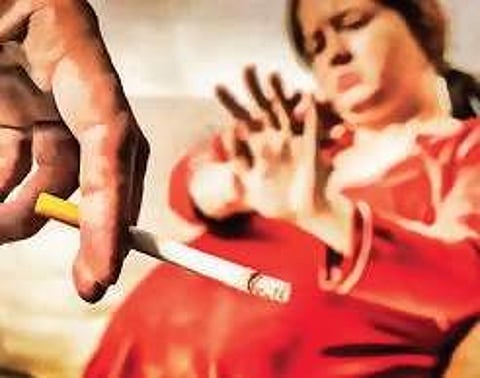

CHENNAI: Most of us are often exposed to passive smoking. While we try to ignore its effects by covering our noses, pregnant women need to be extra careful. When they are exposed to high levels of secondhand smoke, there is a higher rate of miscarriage, stillbirths and fetal deaths. According to World Health Organization (WHO), when a non-smoker inhales smoke from the burning end of a cigarette then she/he is directly exposed to more than 4,000 chemicals and toxic substances which can cause chronic diseases. In fact, non-smokers breathe in the same toxic chemicals as smokers do.
Such secondhand smoking is reported in majority in social gatherings and workplaces apart from home. Secondhand smoke can stay in the air for several hours and travel up to 20 feet. More than 80 per cent of secondhand smoke is invisible, doesn’t have an odour and is highly toxic. Such exposure can lead to a variety of health issues in adults, children and pregnant women.
RISK & HAZARD When pregnant women inhale hazardous chemical substances present in secondhand smoke, it reaches the fetus through placenta, the structure which provides oxygen and nutrients to growing baby. The inhaled nicotine which is largely present in secondhand smoke can decrease the blood flow to the unborn baby affecting its heart, lungs, digestive system and central nervous system.
EFFECTS ON MOTHERS Pregnant women who are exposed to secondhand smoke have an increased risk of intrauterine growth retardation and lower birth weight. They are likely to give birth to a baby with weaker lungs and with increased health issues.
EFFECTS ON NEWBORNS The baby is more likely to be born pre-mature and needs to stay in hospital for long period after birth. Babies exposed to secondhand smoke are about three times more likely to be affected by Sudden Infant Death Syndrome (SIDS), a disorder where an infant die unexpectedly while they are in sleep.
SMOKE-FREE SPACES Your home should be tobacco smoke-free and ventilated. Prevent family members from smoking. In workplace and public areas, do not allow smoking or move away from the spot. Teach children about smoke-free environment. (The writer is a consultant, obstetrics & gyn e c o l o g y, Motherhood H o s p i t a l , Chennai)